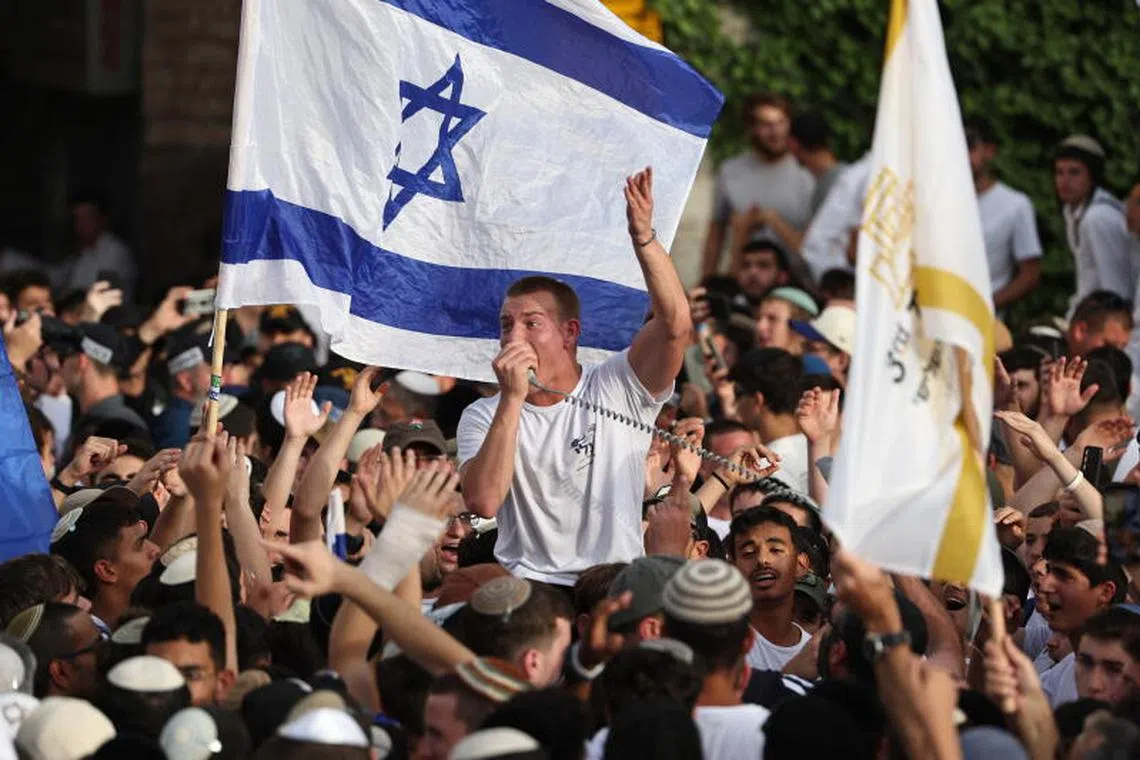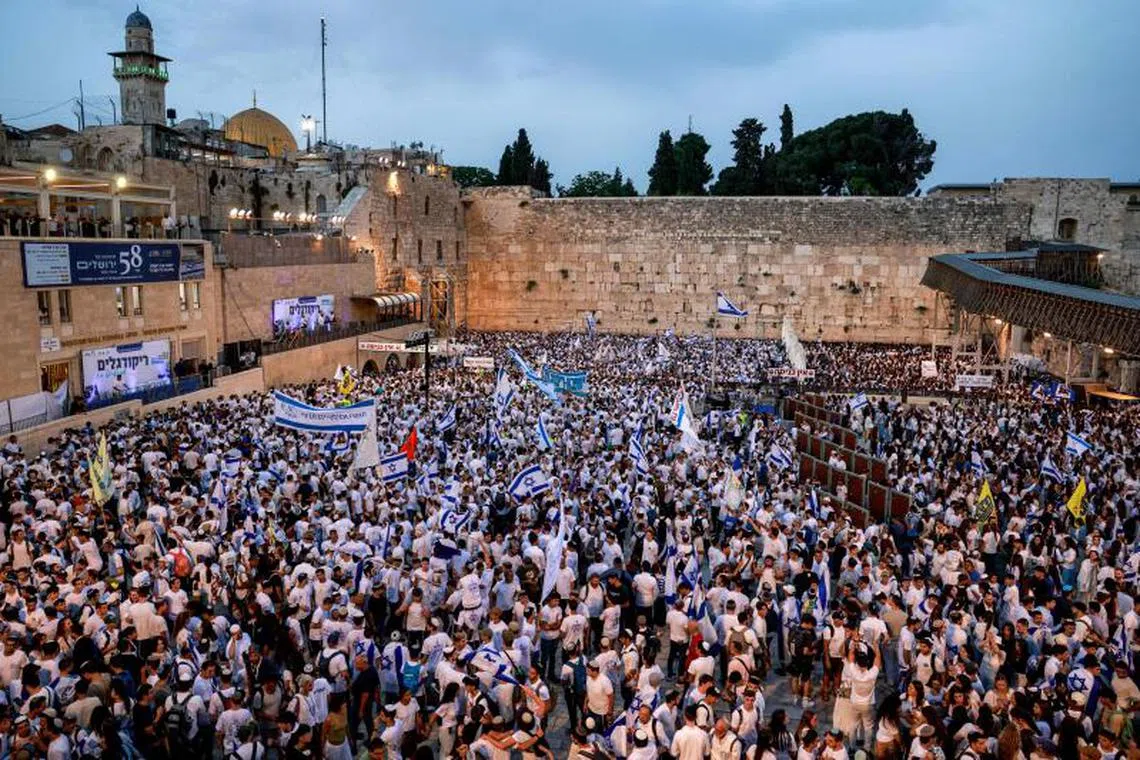Scuffles, insults as Israelis celebrate Jerusalem Day under shadow of Gaza war
Sign up now: Get ST's newsletters delivered to your inbox

Right-wing Israelis gathering near Damascus Gate during the Israeli "flag march" in the Old City of Jerusalem on May 26.
PHOTO: EPA-EFE
Follow topic:
JERUSALEM – Crowds of Israelis streamed through Jerusalem’s Old City, where some scuffled with residents and hurled insults at Palestinians, as annual celebrations of Israel’s capture of East Jerusalem took place on May 26.
Jerusalem Day, as the celebrations are known, commemorates Israeli forces taking East Jerusalem during the 1967 Arab-Israeli war.
Israel considers all of Jerusalem, including the annexed Palestinian-majority east, its indivisible capital. The international community, however, does not recognise this, and Palestinians seek East Jerusalem as the capital of a future state.
Far-right Israeli minister Itamar Ben Gvir on May 26 visited the Al-Aqsa Mosque compound, known to Jews as the Temple Mount, to mark the occasion, which was being held for a second year under the shadow of the war in Gaza.
“I ascended to the Temple Mount for Jerusalem Day, and prayed for victory in the war” and the return of hostages held in Gaza, said the National Security Minister, whose past visits to the site have sparked anger among Palestinians and their supporters.
The Al-Aqsa Mosque is Islam’s third-holiest site and a symbol of Palestinian national identity.
The Temple Mount is Judaism’s holiest place, though Jews are forbidden from praying there.
Every year, thousands of Israeli nationalists, many of them religious Jews, march through Jerusalem and its annexed Old City, including in predominantly Palestinian neighbourhoods, waving Israeli flags, dancing and sometimes accosting residents.

Israeli far-right Minister of National Security Itamar Ben-Gvir, surrounded by security officers, at Damascus Gate during the Israeli “flag march” in the Old City of Jerusalem.
PHOTO: EPA-EFE
‘Our one and only holy city’
The route ends at the Western Wall, the last remnant of the Second Temple destroyed by the Romans in AD70, the holiest site where Jews are allowed to pray.
“After so many years that the people of Israel were not here in Jerusalem and in the land of Israel, we arrived here and conquered Jerusalem, the Temple Mount and the Western Wall,” said 21-year-old yeshiva student Yosef Azoulai. “So we celebrate this day in which we won over all our enemies.”
Groups of Israeli youths were seen confronting Palestinian shopkeepers, passers-by and schoolchildren, as well as Israeli rights activists and police, at times spitting on people, lobbing insults and trying to force their way into houses.
Some chanted “death to Arabs”, “may your village burn” and “Gaza belongs to us”, drawing the occasional uncomfortable look from families making their way to the Western Wall.
As evening settled in, large crowds had congregated to celebrate at the holy site.
The authorities sometimes order Palestinian shops in the Old City to shut, though business owners this year said they had mostly closed down out of fear of harassment.
Outside the Old City, former Knesset member Moshe Feiglin was advertising his far-right political party Identity.
“Every nation and every religion has its capital... but for some reason, all the nations want a part of our one and only holy city,” he said.
“Jerusalem belongs to the Jews and only to the Jews,” he added.

People gathering at the Western Wall Plaza in the Old City of Jerusalem on May 26.
PHOTO: AFP
Jerusalem Day in 2025 comes amid renewed calls by some Israeli right-wing figures to annex more Palestinian territory as the war in Gaza rages.
On May 26, the Israeli army said three projectiles were launched from Gaza, two falling inside the territory and one intercepted.
In 2021, Hamas launched rockets towards Jerusalem as marchers approached the Old City, sparking a 12-day war in Gaza and outbreaks of violence in Israel between Israelis and Palestinians.
A ‘different kind of Jerusalem’
Israel banned the UN’s agency for Palestinian refugees, UNRWA, from operating in East Jerusalem earlier in 2025 over accusations that it provided cover for Hamas militants, and on May 26, a group of Israelis forced their way into one of its vacated compounds in the city.
“The group asserted they were ‘liberating’” the facility, UNRWA West Bank director Roland Friedrich said on X.
“The group brought flags and erected banners, seeking to claim the compound for the establishment of a new Israeli neighbourhood. Israeli police, alerted to the scene, failed to protect the inviolability of the @UN premises.”
The police, who deployed in force, said that over the course of the day “officers have handled numerous cases of suspects involved in public disturbances”.
In the morning, peace activists handed out flowers to challenge what they saw as the main march’s divisive message.
Ms Orly Likhovski of the Israel Religious Action Centre said those taking part in the peace event were “not willing to accept that this day is marked by violence and racism”, adding that they hoped to represent “a Jewish voice for a different kind of Jerusalem”.
Some Palestinians accepted the flowers, but one elderly man near Damascus Gate politely refused, saying: “Do you see what is happening in Gaza? I’m sorry, but I cannot accept.”
In a rare move, the Israeli Cabinet met nearby in the predominantly Palestinian neighbourhood of Silwan, home to an archaeological site known as the City of David – believed to mark the biblical location of Jerusalem.
At the meeting, Prime Minister Benjamin Netanyahu vowed to “keep Jerusalem united, whole and under Israeli sovereignty”.
Since June 1967, Israeli settlement in the eastern part of the city – considered illegal under international law – has expanded, drawing regular international criticism. AFP

